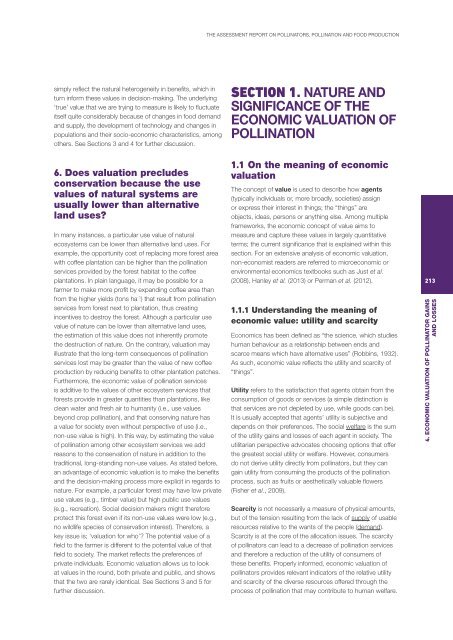POLLINATORS POLLINATION AND FOOD PRODUCTION
individual_chapters_pollination_20170305
individual_chapters_pollination_20170305
You also want an ePaper? Increase the reach of your titles
YUMPU automatically turns print PDFs into web optimized ePapers that Google loves.
THE ASSESSMENT REPORT ON <strong>POLLINATORS</strong>, <strong>POLLINATION</strong> <strong>AND</strong> <strong>FOOD</strong> <strong>PRODUCTION</strong><br />
simply reflect the natural heterogeneity in benefits, which in<br />
turn inform these values in decision-making. The underlying<br />
‘true’ value that we are trying to measure is likely to fluctuate<br />
itself quite considerably because of changes in food demand<br />
and supply, the development of technology and changes in<br />
populations and their socio-economic characteristics, among<br />
others. See Sections 3 and 4 for further discussion.<br />
SECTION 1. NATURE <strong>AND</strong><br />
SIGNIFICANCE OF THE<br />
ECONOMIC VALUATION OF<br />
<strong>POLLINATION</strong><br />
6. Does valuation precludes<br />
conservation because the use<br />
values of natural systems are<br />
usually lower than alternative<br />
land uses?<br />
In many instances, a particular use value of natural<br />
ecosystems can be lower than alternative land uses. For<br />
example, the opportunity cost of replacing more forest area<br />
with coffee plantation can be higher than the pollination<br />
services provided by the forest habitat to the coffee<br />
plantations. In plain language, it may be possible for a<br />
farmer to make more profit by expanding coffee area than<br />
from the higher yields (tons ha -1 ) that result from pollination<br />
services from forest next to plantation, thus creating<br />
incentives to destroy the forest. Although a particular use<br />
value of nature can be lower than alternative land uses,<br />
the estimation of this value does not inherently promote<br />
the destruction of nature. On the contrary, valuation may<br />
illustrate that the long-term consequences of pollination<br />
services lost may be greater than the value of new coffee<br />
production by reducing benefits to other plantation patches.<br />
Furthermore, the economic value of pollination services<br />
is additive to the values of other ecosystem services that<br />
forests provide in greater quantities than plantations, like<br />
clean water and fresh air to humanity (i.e., use values<br />
beyond crop pollination), and that conserving nature has<br />
a value for society even without perspective of use (i.e.,<br />
non-use value is high). In this way, by estimating the value<br />
of pollination among other ecosystem services we add<br />
reasons to the conservation of nature in addition to the<br />
traditional, long-standing non-use values. As stated before,<br />
an advantage of economic valuation is to make the benefits<br />
and the decision-making process more explicit in regards to<br />
nature. For example, a particular forest may have low private<br />
use values (e.g., timber value) but high public use values<br />
(e.g., recreation). Social decision makers might therefore<br />
protect this forest even if its non-use values were low (e.g.,<br />
no wildlife species of conservation interest). Therefore, a<br />
key issue is; ‘valuation for who’? The potential value of a<br />
field to the farmer is different to the potential value of that<br />
field to society. The market reflects the preferences of<br />
private individuals. Economic valuation allows us to look<br />
at values in the round, both private and public, and shows<br />
that the two are rarely identical. See Sections 3 and 5 for<br />
further discussion.<br />
1.1 On the meaning of economic<br />
valuation<br />
The concept of value is used to describe how agents<br />
(typically individuals or, more broadly, societies) assign<br />
or express their interest in things; the “things” are<br />
objects, ideas, persons or anything else. Among multiple<br />
frameworks, the economic concept of value aims to<br />
measure and capture these values in largely quantitative<br />
terms; the current significance that is explained within this<br />
section. For an extensive analysis of economic valuation,<br />
non-economist readers are referred to microeconomic or<br />
environmental economics textbooks such as Just et al.<br />
(2008), Hanley et al. (2013) or Perman et al. (2012).<br />
1.1.1 Understanding the meaning of<br />
economic value: utility and scarcity<br />
Economics has been defined as “the science, which studies<br />
human behaviour as a relationship between ends and<br />
scarce means which have alternative uses” (Robbins, 1932).<br />
As such, economic value reflects the utility and scarcity of<br />
“things”.<br />
Utility refers to the satisfaction that agents obtain from the<br />
consumption of goods or services (a simple distinction is<br />
that services are not depleted by use, while goods can be).<br />
It is usually accepted that agents’ utility is subjective and<br />
depends on their preferences. The social welfare is the sum<br />
of the utility gains and losses of each agent in society. The<br />
utilitarian perspective advocates choosing options that offer<br />
the greatest social utility or welfare. However, consumers<br />
do not derive utility directly from pollinators, but they can<br />
gain utility from consuming the products of the pollination<br />
process, such as fruits or aesthetically valuable flowers<br />
(Fisher et al., 2009).<br />
Scarcity is not necessarily a measure of physical amounts,<br />
but of the tension resulting from the lack of supply of usable<br />
resources relative to the wants of the people (demand).<br />
Scarcity is at the core of the allocation issues. The scarcity<br />
of pollinators can lead to a decrease of pollination services<br />
and therefore a reduction of the utility of consumers of<br />
these benefits. Properly informed, economic valuation of<br />
pollinators provides relevant indicators of the relative utility<br />
and scarcity of the diverse resources offered through the<br />
process of pollination that may contribute to human welfare.<br />
213<br />
4. ECONOMIC VALUATION OF POLLINATOR GAINS<br />
<strong>AND</strong> LOSSES


